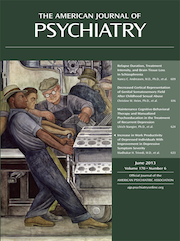The
Journal has learned from the authors of the article “Defective Processing Speed and Nonclinical Psychotic Experiences in Children: Longitudinal Analyses in a Large Birth Cohort” (Am J Psychiatry 2013; 170:
550-557) that they misinterpreted one of the findings involving the analysis of change over time in processing speed, where it was reported that a decline in processing speed over time was associated with an increased odds of psychotic experiences. The result should have been interpreted as children with psychotic experiences showing an improvement in processing speed at age 11 compared to age 8.
This means that in the abstract, there should not be a statement indicating that a decline in processing speed between the ages of 8 and 11 was associated with higher risk of psychotic experiences at age 12.
In the Results section “Change Over Time in Cognitive Performance and Psychotic Experiences at Age 12” it should be an improvement, and not a decline, or processing speed associated with greater odds of psychotic experiences, and the authors wish to change the end of the section to reflect that there wasn’t weak evidence but rather no evidence of change in attention (p=0.33) or working memory (p=0.78) and psychotic experiences.
Last, in the “Change in Cognition Over Time” section of the Discussion, since it was actually an improvement in processing speed rather than a decline that was associated with the development of psychotic experiences, instead of supporting the existence of an aberrant neurodevelopmental process in children at high risk of developing schizophrenia in agreement with the literature, this finding is contrary to the author’s hypothesis and previous findings. One possible explanation the authors put forth is that the results reflect a “catchup” effect. Processing speed improves rapidly in early childhood, but improves at a much slower rate closer to adolescence. If this normal development is delayed in children with psychotic experiences, they might show greater deficits relative to their peers at age 8 but show little difference by age 11, resulting in a relatively greater improvement over time. The authors were not able to test whether the change in processing speed in children with psychotic experiences is due to such a ‘catch-up’ effect because they had data at only two time points.
All other findings were correct and the main findings remain the same. A corrected version of the article was posted online on May 20, 2013, that incorporated these changes.

